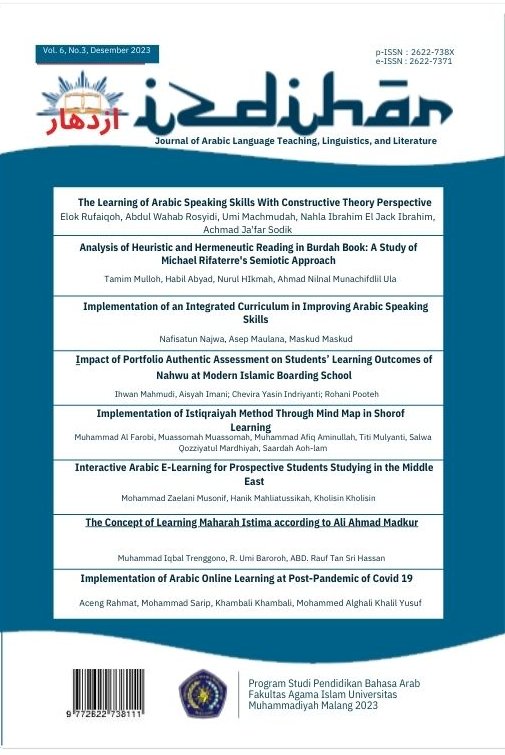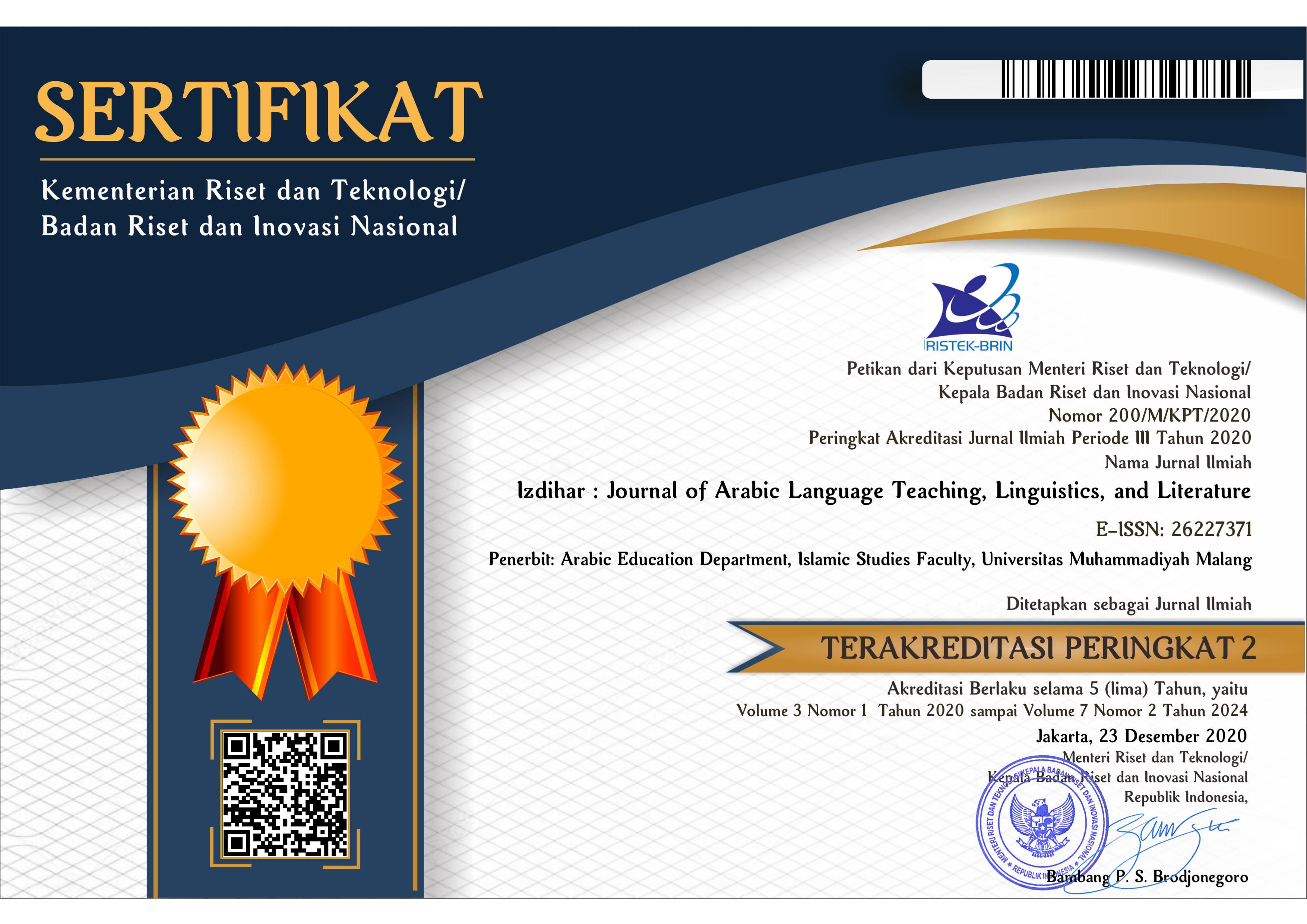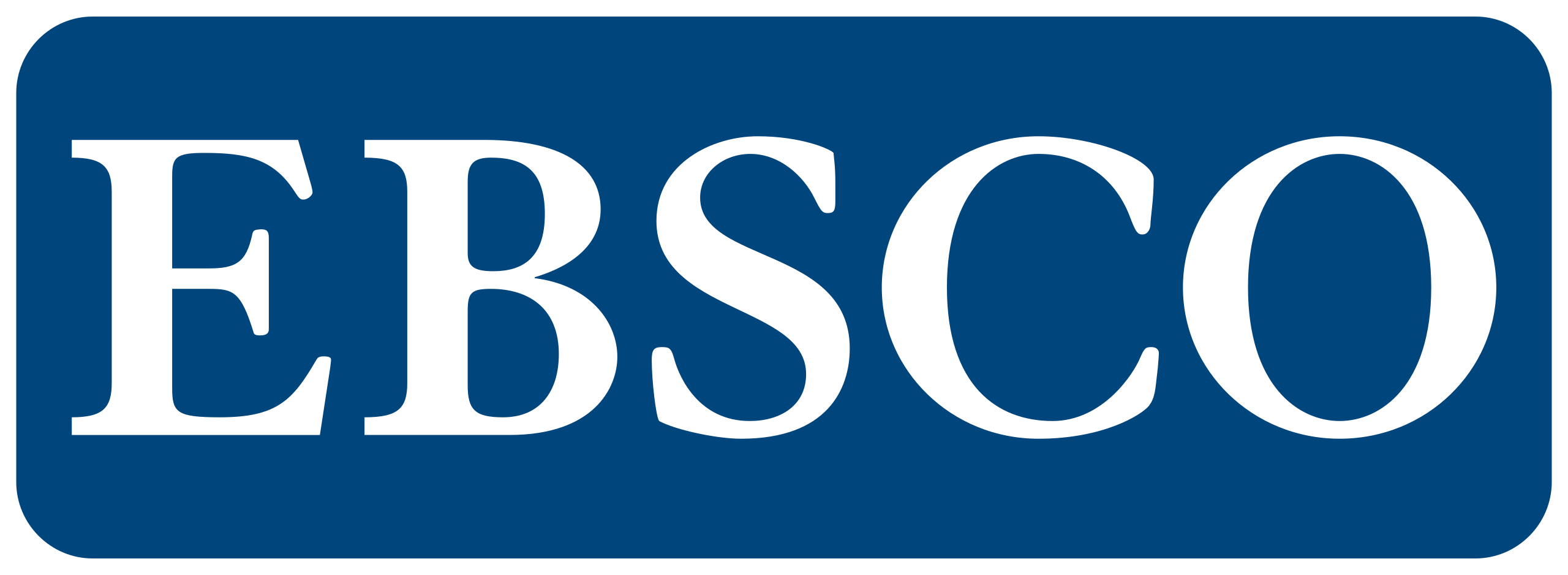Impact of Portfolio Authentic Assessment on Students’ Learning Outcomes of Nahwu at Modern Islamic Boarding School
DOI:
https://doi.org/10.22219/jiz.v6i3.27441Keywords:
Nahwu Science, Portfolio Authentic Assessment, Nahwu LearningAbstract
The study aimed to investigate the potential beneficial impact of portfolio assessment on the learning outcomes of Nahwu lessons of fourth-grade students at the Modern Islamic Boarding School of Al-Ikhlash Female in Kuningan, West Java. The study used an experimental methodology and a quantitative research approach. The research sample included all fourth graders. The research was carried out during the odd semester of academic year 2022. A quasi-experimental design used to evaluate the effectiveness of portfolio assessment, with the experimental class implementing portfolio assessment while the control class continued to use the standard evaluation method. The learning outcomes of the students in the control class produced an average score of 71.67. Comparing the experimental class’ score, which used portfolio assessment, it become clear that the students’ comprehension of the Nahwu material had significantly improved. These results showed that portfolio evaluations have a chance to improve fourth-grade students’ learning outcomes in Nahwu.
Downloads
References
Aheisibwe, I., Kobusigye, L., & Tayebwa, J. (2021). Bridging Education Gap in Higher Institutions of Learning Using Bloom’s Taxonomy of Educational Objectives. African Educational Research Journal, 9(1), 69–74. https://doi.org/10.30918/AERJ.91.20.213
Albantani, A. M. (2018). Metode Pembelajaran Sastra Arab. Alfaz (Arabic Literatures for Academic Zealots), 6(01), 17. Https://doi.org/10.32678/alfaz.Vol6.Iss01.711
Arifianto, M. L., Ahsanuddin, M., Ainin, M., Irhamni, I., Fitria, N., & Rahmah, L. A. (2022). Pelatihan Pengembangan Tes Interaktif Bahasa Arab Untuk Alumni Jurusan Sastra Arab Fakultas Sastra Universitas Negeri Malang. ABDIMAS UNWAHAS, 7(1), Article 1. Https://doi.org/10.31942/abd.v7i1.6571
Brosh, H. Y. (2019). Arabic language-learning strategy preferences among undergraduate students. Studies in Second Language Learning and Teaching, IX(2), 351–377. https://doi.org/10.14746/ssllt.2019.9.2.5
Cabrera-Solano, P. (2020). The Use of Digital Portfolios to Enhance English as a Foreign Language Speaking Skills in Higher Education. International Journal of Emerging Technologies in Learning (IJET), 15(24), 159–175. https://doi.org/10.3991/ijet.v15i24.15103
Hajaroh, S., & Adawiyah, R. (2018). Kesulitan Guru Dalam Mengimplementasikan Penilaian Autentik.
He Xinyu, X., Deng, Y., Yu, S., & Wang, H. (2020). The Influence of Context on the Large-Scale Assessment of High School Students’ Epistemic Cognition of Scientific Argumentation. Science & Education, 29(1), 7–41. Https://doi.org/10.1007/s11191-019-00088-4
Ismail, S. M., Rahul, D. R., Patra, I., & Rezvani, E. (2022). Formative vs. Summative assessment: Impacts on academic motivation, attitude toward learning, test anxiety, and self-regulation skill. Language Testing in Asia, 12(1), 40. Https://doi.org/10.1186/s40468-022-00191-4
Kaukab, M. E., Salamah, & Rahman, R. A. (2021). Penilaian Autentik Dalam Pembelajaran Bahasa Arab. NIVEDANA : Jurnal Komunikasi Dan Bahasa, 2(1), Article 1. Https://doi.org/10.53565/nivedana.v2i1.282
Mahmudi, I. (2018). Rubrik Analitik Penilaian Hasil Belajar Praktik Pendidikan Agama Islam. Fikrah: Journal of Islamic Education, 2(2). https://doi.org/10.32507/fikrah.v2i2.406
Mahmudi, I., & Nadhifah, L. (2020). Peningkatan Hasil Belajar Fiqih Dengan Strategi Pembelajaran Example Non Example Siswi Kelas 1 Pondok Modern Darussalam Gontor Putri Kampus 1. Al-Tadzkiyyah: Jurnal Pendidikan Islam, 11(1), Article 1. Https://doi.org/10.24042/atjpi.v11i1.5962
Mahmudi, I., & Shofro, M. L. (2019). Peningkatan Hasil Belajar Tarikh Islam Melalui Strategi Pembelajaran Everyone is a Teacher Here pada Siswi Kelas 2 KMI Pondok Modern Darussalam Gontor Putri. Jurnal Tatsqif, 17(2), Article 2. Https://doi.org/10.20414/jtq.v17i2.1962
Mohajan, H. K. (2020). Quantitative Research: A Successful Investigation in Natural and Social Sciences. Journal of Economic Development, Environment and People, 9(4), 50–79. https://doi.org/10.26458/jedep.v9i4.679
Monib, W. K., Karimi, A. Q., & Nijat, N. (2020). Effects of Alternative Assessment in EFL Classroom: A Systematic Review. American International Journal of Education and Linguistics Research, 3(2), Article 2. Https://doi.org/10.46545/aijelr.v3i2.195
Muhammad, A., Idhan, & Punawan, A. S. Bin. (2020). Nahwu, Origin and Its Urgences in Arabic Learning. In Online Submission (Vol. 24, Issue 6, pp. 6894–6900). Https://eric.ed.gov/?Id=ED608786
Nguyen, T. T. K., & Phan, H. M. (2020). Authentic Assessment: A Real Life Approach To Writing Skill Development. International Journal of Applied Research in Social Sciences, 2(1), Article 1. Https://doi.org/10.51594/ijarss.v2i1.97
Nurgiyantoro, B. (2011). Model Penilaian Otentik Dalam Pembelajaran Bahasa. LITERA, 10(2), Article 2. Https://doi.org/10.21831/ltr.v10i2.1157
Nurtanto, M., Kholifah, N., Masek, A., Sudira, P., & Samsudin, A. (2021). Crucial Problems in Arranged the Lesson Plan of Vocational Teacher. International Journal of Evaluation and Research in Education, 10(1), 345–354.
Révész, J. R., Andrea. (2019). Experimental and quasi-experimental designs. In The Routledge Handbook of Research Methods in Applied Linguistics. Routledge. http://doi.org/10.11591/ijere.v10i1.20604
Sa’adah, N. (2019). Problematika Pembelajaran Nahwu bagi Tingkat Pemula Menggunakan Arab Pegon. Lisanan Arabiya: Jurnal Pendidikan Bahasa Arab, 3(1), 15–32. Https://doi.org/10.32699/liar.v3i01.995
Safriyani, R. (2012). Portofolio as an authentic assessment in teaching English for young learners. MADRASATUNA (Jurnal Pengembangan Madrasah Ibtidaiyah), 4(1), Article 1. http://madrasatuna.uinsby.ac.id/index.php/madrasatuna/article/view/8
Sari, E. D. K., & Mahmudi, I. (2019). The Effect Of Authentic Assessment And Teaching Variation Toward Fiqih Learning Outcomes (An Experiment at Ponpes An Nida Al islamybekasi). At-Ta’dib, 14(2), Article 2. Https://doi.org/10.21111/at-tadib.v14i2.3256
Shaturaev, J. (2021). Financing and Management of Islamic (Madrasah) Education in Indonesia. Zeszyty Naukowe Politechniki Częstochowskiej. Zarządzanie, 42, 57–65. Https://doi.org/10.17512/znpcz.2021.2.05
Siregar, I. (2021). Epistemological Challenges Against Sociolinguistics. International Journal of Linguistics Studies, 1(2), Article 2. Https://doi.org/10.32996/ijls.2021.1.2.6
Sugiyono, S. (2018). Metode Penelitian Pendidikan, Pendekatan Kuantitatif, Kualitatif, dan R&D. Alfabeta.
Sulistyo, T., Eltris, K. P. N., Mafulah, S., Budianto, S., Saiful, & Heriyawati, D. F. (2020). Portfolio Assessment: Learning Outcomes and Students’ Attitudes. Http://repository.unisma.ac.id/handle/123456789/2349
Syafi’i, A. S., Akmal, A., & Bulan, S. (2023). Pemahaman dan Praktik Guru dalam Melaksanakan Penilaian Mata Pelajaran Pendidikan Agama Islam di mts As’adiyah Uloe. Wahana Karya Ilmiah Pendidikan, 7(01), Article 01. Https://doi.org/10.35706/wkip.v7i01.8923
Usmadi, U. (2020). Pengujian Persyaratan Analisis (Uji Homogenitas Dan Uji Normalitas). Inovasi Pendidikan, 7(1). Https://doi.org/10.31869/ip.v7i1.2281
Wanti, A. I., a’yuni, Q., & Chamidah, D. (2022). Model Dan Praktik: Asesmen Formatif NonPaper-Based Dalam Pembelajaran Bahasa Arab. Arabi : Journal of Arabic Studies, 7(1), Article 1. Https://doi.org/10.24865/ajas.v7i1.419
Yarun, A., & Markus, M. (2023). Higher Order Thinking Skill (HOTS) Students in Indonesia and Saudi Arabia (Comparative Study of Assessment Application in Schools). Journal of Contemporary Islamic Education, 3(2), Article 2. https://doi.org/10.25217/jcie.v3i2.3787
Downloads
Published
How to Cite
Issue
Section
License
Copyright (c) 2024 Ihwan Mahmudi, Aisyah Imani; Chevira Yasin Indriyanti; Rohani Pooteh

This work is licensed under a Creative Commons Attribution-ShareAlike 4.0 International License.
Copyright Notice
Authors who publish with this journal agree to the following terms:
- Authors retain copyright and grant the journal right of first publication with the work simultaneously licensed under a Creative Commons Attribution-ShareAlike 4.0 International License that allows others to share the work with an acknowledgment of the work's authorship and initial publication in this journal.
- Authors are able to enter into separate, additional contractual arrangements for the non-exclusive distribution of the journal's published version of the work (e.g., post it to an institutional repository or publish it in a book), with an acknowledgment of its initial publication in this journal.
- Authors are permitted and encouraged to post their work online (e.g., in institutional repositories or on their website) prior to and during the submission process, as it can lead to productive exchanges, as well as earlier and greater citation of published work (See The Effect of Open Access).
Copyright (c) 2019 Izdihar : Journal of Arabic Language Teaching, Linguistics, and Literature

This work is licensed under a Creative Commons Attribution-ShareAlike 4.0 International License.


















